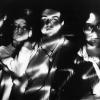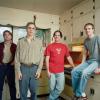Flagpole at SXSW: Buzz Aldrin Speaks

Photo Credit: Mike White
It's both sad and fascinating that, for all the promotion STEM (science, technology, engineering and math) and STEAM (the same, but with arts) education has gotten over the past two decades, only a slight handful of college-age acquaintances showed any sign of recognition when I said I was gonna see astronaut Edwin Eugene “Buzz” Aldrin Jr. do a live talk with writer Jeffrey Kluger.
Aldrin, of course, was the second person ever to walk on the moon as part of the Apollo 11 mission in 1969, but three years earlier he was the first person to ever successfully conduct a spacewalk, or in NASA's terms, "extravehicular activity" (Gemini XII, 1966). Over the past five decades, he's authored nine books, established the ShareSpace Foundation (which focuses on STEAM) and started the Buzz Aldrin Space Institute at Florida Tech.
Jeffrey Kluger, senior writer at Time magazine and author of multiple books on NASA and the space program, in addition to decades of science coverage for various publications, was a natural choice to host the perennially cool Aldrin. Every 86-year-old I've ever known was pretty cool with not doing much of anything. Last December and this January, Aldrin became the oldest person to ever reach the South Pole, got evacuated for medical reasons after reaching it, and then walked the catwalk in a Bill Nye-hosted show during Fashion Week wearing a shirt that said "Get Your Ass to Mars."
Officially participating in SXSW as an "Entertainment Influencer" (?), with his Virtual Reality program "Buzz Aldrin: Cycling Pathways To Mars" being showcased this week in the conference's Virtual Cinema, Aldrin spent precious little time talking about this. He speaks like a man who's spent so much time learning and developing information that it just bursts out of him in seemingly non-linear narratives. He always has a point, even when he's difficult to follow, which can be often.
Even so, his passion for putting human beings on Mars—not as visitors, but as settlers—is palpable. He leans forward; his hands and wrists, decorated with a notable array of rings and costume bracelets, grab the arms of his chair. He describes his passion as one of progress, not platitude. "We didn't want any more of this 'flags and footprints' [stuff]", he said, referencing politicians' view of space programs as means of conquest and showy patriotism, as opposed to platforms for understanding and collaboration.
He joked, with serious undertones, about how the ending of the U.S. Space Shuttle program in 2011—without any solid plans for a replacement—has required all International Space Station crews to be transported by Russia. Ironically, he said Congress doesn't like it when NASA talks with Russia. But he emphasized the fact that's he's not tied to anyone—he refers to himself as a "space statesmen"—saying, "Congress is really ugly right now. NASA can't even talk to Russia. Now, I'm not with them, so I can."
Interestingly, Aldrin said the way to occupy Mars is for the president to make the challenge. In early 1961, John F. Kennedy went to NASA in the middle of a work week and originally proposed going to Mars. "That was the busiest weekend in NASA history," Aldrin said. NASA replied that it was impossible, but maybe the moon was a reasonable goal. Kennedy, wanting this to happen during his presidency, asked for a four-year goal point. NASA countered with 10. Before the decade was over, it happened.
"We, as a nation, don't care too much about the sciences," Aldrin noted. Kluger later said that—I'm paraphrasing here—adjusted for inflation, the budget for NASA during the moon race was $60 billion (4 percent of the nation's budget). Now, it's $20 billion (.04 percent). I checked his numbers against available published budget information, and it's even more disheartening. Between 1961–1969, the height of moon mania, NASA averaged 5.38 percent of the national budget and received an average of $3 billion per year adjusted. In 2016 alone, NASA spent $16 billion, but this accounts for a mere .5 percent of the national budget.
Just before he closed the formal talk and started to take questions, Kluger noted that his new book was available for pre-sale. As if on cue, Aldrin belted out, "I got nine books!" Finally, Kluger asked Aldrin if there's any room for those who view space travel and visiting other planets as extensions of our humanity—a "form of poetry" versus the "raw pragmatism" of bean counters and product-oriented scientists.
Aldrin answered simply and beautifully: "We explore or we expire."













comments